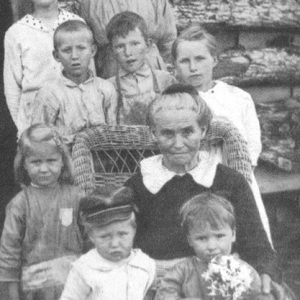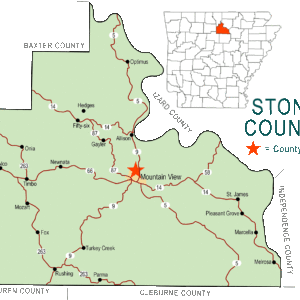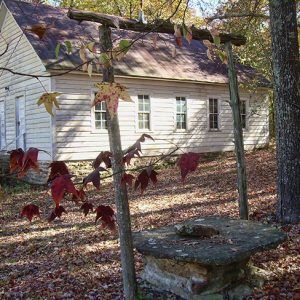calsfoundation@cals.org
Turkey Creek (Stone County)
Turkey Creek is a valley of rugged, rocky soil, isolated in the hills. It is located at the intersection of Highway 9 and Brushy Creek Road, almost nine miles southwest of Mountain View, the seat of Stone County. Fox (Stone County) is five miles north-northwest, and Rushing (Stone County) is about four miles southwest. The community is named for the creek that flows nearby and joins Brushy Creek.
Settlers began subsistence farming along Turkey and Brushy creeks following the Civil War. The passage of the Homestead Act in 1862 encouraged a few hardy farmers to make claims along the Little Red River at Meadowcreek (Stone County) about ten miles away. Gradually, some of the farmers inched their way up the mountain to Turkey Creek and began eking out a living from the rocky soil. Raising livestock was also an important part of survival, as was hunting for small game, deer, and bears. Settlers also gathered wild plants and berries such as poke sallet, muscadines, and persimmons. Fishing in the creeks supplemented the settlers’ diets. Corn was a favorite crop, and sometimes moonshine stills popped up in the woods.
The life of the first postmaster, Jesse Files, is typical of those who settled at Turkey Creek. Files and his wife, Melvina Roby, were born in Alabama in the early 1800s. Jesse Files served in the Union army in the 1st Alabama Cavalry (US) during the Civil War, as did two of his sons, who both died in the war. Afterward, the family sought a new life in the hills of Arkansas and ended up in the tranquil valley of Turkey Creek. File Hill in Turkey Creek Township is named for the File family.
Turkey Creek’s most famous citizen was James Hiram (Jim) Berry, known as the man who killed the notorious Civil War bushwhacker and outlaw Bill Dark. Dark hid out in Dark Holler at Timbo (Stone County) and in the Rorie Cave near Onia (Stone County). He terrorized the hill people until early 1863, when the teenaged Berry shot him with a cap-and-ball pistol in an encounter on the middle fork of the Little Red River a few miles upriver from present-day Shirley (Van Buren County). Berry died at Turkey Creek and is buried in Rushing Cemetery, which serves the Turkey Creek community. Folk artist Jimmy Driftwood of Timbo told the story in his song “The Ballad of Jim Berry.”
The Turkey Creek post office was established in 1879 but closed in 1881. Turkey Creek only had two postmasters, the first being Jesse Files, appointed on February 7, 1879, and James M. Clinkingbeard, appointed on February 17, 1880. The U.S. Postal Service replaced the Turkey Creek post office with one at nearby Rushing, which operated from 1882 until 1971. The post office established at Fox has been active since 1901.
The Turkey Creek School was built in 1925, although the wooden one-floor structure on a stone foundation resembles traditional rural schools of an earlier time. The building was placed on the National Register of Historic Places on October 25, 1985. The Rural Special School District was created in 1946 in Fox. All the country districts in this wooded, mountainous part of Stone County—including Fox, Meadowcreek, Mozart, Parma, Rushing, Sunnyland, and Turkey Creek—merged to form Rural Special. In July 2004, under Act 60 of the Arkansas General Assembly, Rural Special became part of the Mountain View’s school system but was allowed to keep its own campus. The old Turkey Creek school building remains a focal point for the community and is still used as a meeting and gathering place.
Turkey Creek remains isolated in the hills. A few houses along Highway 9 and Brushy Creek Road make up the Turkey Creek community. The Antioch Baptist Church is nearby, and other religious establishments are in Fox and Rushing. The Fox Fire Department Station One is in the Turkey Creek Township.
For additional information:
Davis, Michael A. “The Legend of Bill Dark: Guerrilla Warfare, Oral History and the Unmaking of an Arkansas Bushwhacker.” Arkansas Historical Quarterly 58 (Winter 1999): 414–429.
Driftwood, Jimmy. “Voice of the Hills.” Mountain View Herald, January 15, 1953.
Kenneth Rorie
Van Buren, Arkansas
 Martha Ellen Daley Long
Martha Ellen Daley Long  Stone County Map
Stone County Map  Turkey Creek School
Turkey Creek School 




Comments
No comments on this entry yet.